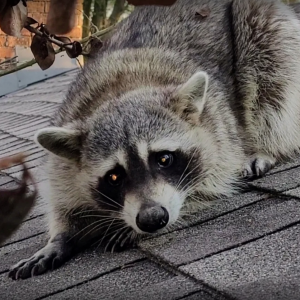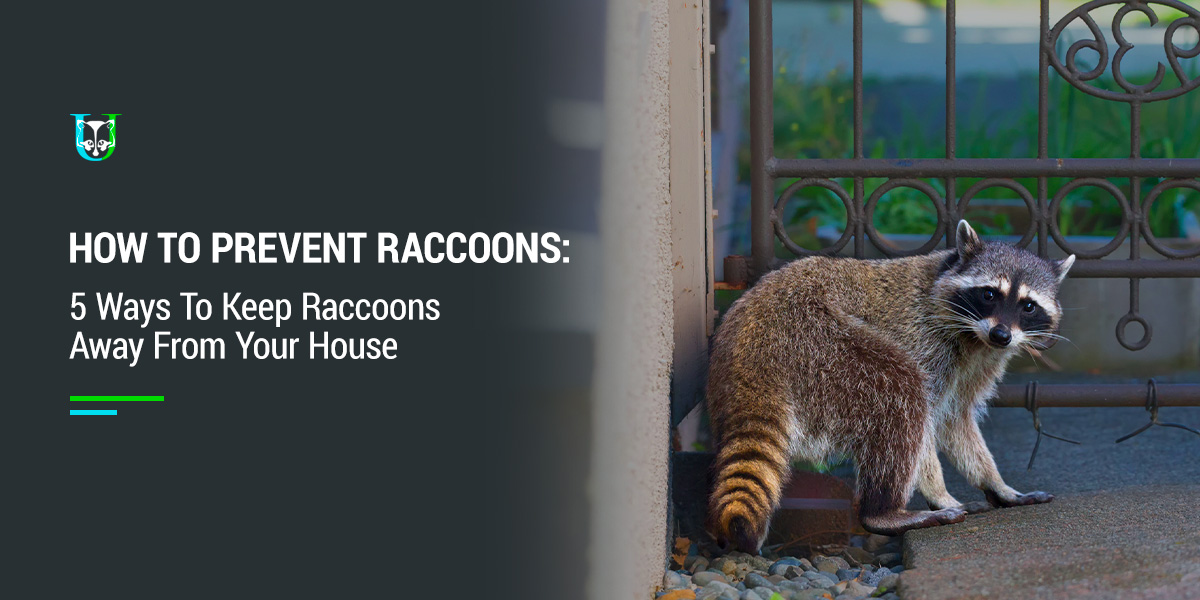Raccoons are one of the most common wildlife home invaders in most parts of the U.S. They typically enter through soffits or other gaps in your home to den in attics and crawlspaces. Having a raccoon in your home can be a major nuisance, as they damage your property and pose several health and safety risks to you and your family.

What Does a Raccoon Look Like?
Raccoons have grayish-brown fur with a black mask around their eyes and a ringed, bushy tail. Full-grown raccoons are usually about 3 feet long from head to hindquarters and can weigh well over 20 lbs. They have human-like hands, each with five long toes that bend and act as fingers, making them excellent climbers.
What Do Raccoons Eat and What Would Attract Them to Your Home?
Raccoons are omnivores that eat plants and small animals like insects, worms, rats, mice, birds, and snakes in the wild. In urban and suburban environments, they will rummage through trash and eat anything they can get their hands on, such as leftover food. Raccoons eat birdseed and pet feed, so leaving food around for your cats, dogs, and birds may attract raccoons to your home. If you have chickens in your yard, they may be at risk since raccoons tend to like eating chicks and chicken eggs.
Where Do Raccoons Live in Your Home?
In the wild, you may find raccoons in confined spaces, such as burrows, hollow trees, and muskrat dens. Raccoons are especially fond of small spaces for nesting, giving birth, and raising their young. In residential areas, raccoons may live in small spaces around your house, such as attics, crawlspaces, chimneys, and sheds, so it’s best to close off these areas.
Request Raccoon Removal Services ➔
What Sounds Do Raccoons Make in Your Home?
If you have raccoons in your home, you may hear them interacting with each other by making noises such as snarling, screeching, whimpering, and hissing. Baby raccoons often cry and whine, as you will hear in these videos:
If you can’t hear raccoons interacting with each other, keep an ear out for movement sounds as they walk around the attic, knock trash cans over, or construct new dens on your property. You’ll likely hear these noises better at night since raccoons are nocturnal animals.
FAQs
If you have raccoons in your home, you may have a few questions about their behavior and how you should respond. Here are a few frequently asked questions with answers to help you deal with a raccoon encounter:
Do Raccoons Carry Disease?
Yes, raccoons carry a variety of diseases, such as rabies, leptospirosis, and giardia. However, these diseases affect pets more than humans, leading to canine or feline distemper.
Are Raccoons Aggressive?
Raccoons are usually harmless and won’t attack humans. However, raccoons may become aggressive if they feel threatened.
How Do You Know If You Have Raccoons in Your Home?
When you have raccoons in your home, you almost never see them. You have to identify the problem by noticing the signs of a raccoon’s presence. If you suspect you may have a raccoon infestation in your attic, keep an eye out for the following indications:
- Damaged wiring: Look for signs of damage in your attic, like torn wiring, torn ductwork, and torn insulation.
- Latrines: Raccoons form latrines by repeatedly defecating in the same spot.
- Footprints: The distinct finger-like toes of raccoon paws make it easy to identify their prints in dust or mud.
- Large entry holes: Inspect the outside of your house for possible entry points. Raccoons will tear large holes to get into your home but can also gain entry through openings as small as a deck of cards.
Learn How to Prevent Raccoons ➔
Contact Urban Jungle for Raccoon Removal Services
Ready to get rid of your raccoons? Let us help! Our staff is thoroughly trained and educated in wildlife biology, so they understand exactly how to remove raccoons from your attic quickly and safely.
We want to help you get the raccoon out for good. That’s why we offer wildlife trapping and removal services to get the animals in your house out and exclusion and repair services to make sure they can’t come back in. Contact us today to get started!


